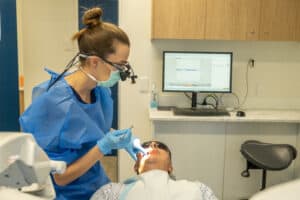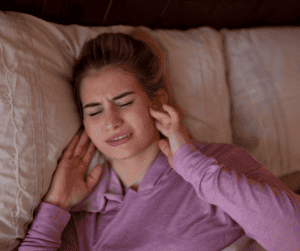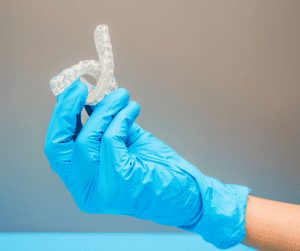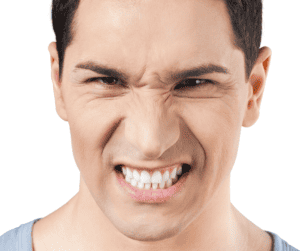Recently, Kathryn and Mishari feel they are seeing an increase in patients who grind their teeth, also known as bruxism. Bruxism is a term for the involuntary clenching or grinding of teeth. It most commonly happens when you are asleep (sleep bruxism) but can also happen when awake. Sleep bruxism is classified as a sleep related movement disorder. Those who brux while sleeping are more likely to have other sleep disorders, like snoring and/or obstructive sleep apnoea. Obstructive sleep apnoea is when there are pauses in breathing during sleeping and is a serious condition. If you are grinding your teeth during the night, it is important to get this checked with your dentist. So what are the 5 things you should you know about tooth grinding?
Tooth grinding can be symptomless
Some patients don’t know they are doing this – as either they are asleep, or they are doing it throughout the day when they are concentrating on a task and not aware of it. Some people may have a partner who hears them doing it in their sleep, but otherwise they may not know until a trip to the dentist.
Your dentist will know that you are a bruxer!
Clinical signs of bruxism include certain patterns of tooth wear, chipping and breaking of teeth and/or restorations (fillings, crowns, implants). Other signs include tightness and/or enlargement of the muscles which support the jaw joints. These muscles are overworked when grinding your teeth, causing them to enlarge. They can also become tender. Inside the mouth, the tongue and cheeks can give away tell-tale signs that there is grinding and clenching. Therefore, during a dental examination, your dentist can point this out to you, if you have not been aware.

Bruxism can be mistaken for other things
Common symptoms from tooth grinding include:
- Toothache
- Sensitive teeth
- Headaches and neck ache
- Earache
It’s always worth getting these other symptoms checked out by a medical professional. But if you get recurring earache and the GP says your ears are fine – the pain could be coming from your jaw joint Those with sleep bruxism tend to find these symptoms are worse in the morning on waking.

Tooth grinding can cause a lot of damage
Our jaws are actually quite powerful and can create, on average, a maximum biting force of around 164 psi (pounds per square inch). While this doesn’t sound much compared to others in the animal kingdom (check-out the animals with the strongest biting forces here), a study by Nishigawa, Bando and Nakano showed that those with sleep bruxism exceeded the typical daily maximum biting forces.
So, imagine spending your sleeping hours grinding your teeth at greater than the maximum force you think you would be able to bite while awake. If this happens many times per night, on many nights – the damage will add up.
The kind of damage that we see from bruxism are things like:
- Cracks in teeth, which can spread and ultimately lead to loss of teeth.
- Broken teeth, fillings, and crowns
- Chipped teeth/veneers/fillings that can affect the appearance of the smile
- Teeth that become loose
- Teeth that wear down over time – they will start to appear shorter
There can be many different reasons why we grind our teeth
Grinding our teeth can be a short-term or a long-term thing. There’s no real consensus over why we do it and more research is needed in this area. But common thoughts are that bruxism is related to:
- Stress and anxiety
- Certain medications or drug misuse
- Children can grind their teeth as teeth erupt
- Sleep apnoea or other sleep disorders
- Habit
What is the treatment for tooth grinding?
First, other medical causes will be ruled out or treated – for example obstructive sleep apnoea or issues with medications. Unfortunately, we can’t stop you from grinding your teeth. However, we can protect the teeth with the use of a splint – this is a hard plastic mouth-guard that goes over the teeth. It prevents the teeth from meeting in the usual way which can take pressure off the jaw joint and relax the muscles. It also protects the teeth and other dental work (like fillings and veneers) from damage. These are custom fitted to your mouth and at Dentistry On George we provide 3D milled and printed hard acrylic splints as studies have shown these are more effective and they last a lot longer.

Another effective treatment to help loosen up the tight jaw muscles and try and break the habit of clenching and grinding is to see a physiotherapist who specialises in this area. Using both treatment options together, we have seen great improvement in our patients’ symptoms and quality of life.
What can I do at home to help with my tooth grinding?
There are some very useful self-care tips you can try.
- Anti-inflammatories if you are able to take them, like ibuprofen
- Sticking to softer foods
- Avoid things like burgers and apples that need you to open your jaw wide
- Avoid chewing gum
- Try to eat evenly on both sides
- Hold a heat-pack to the jaw joints and muscles around it
- Try relaxation techniques to help with any stress (meditation, a warm bath, a nice walk or doing your favourite hobby)
What do I do if I’m grinding my teeth?
First thing is to make an appointment with your dentist to get this checked out. They will do a thorough exam of your jaw joints and muscles, your teeth and your gums. The dentist will also need to examine the extent of the damage done to the teeth. The teeth may have lots of crack-lines from the all the pressures put on them from clenching and grinding, or they may be showing signs of wear. They will also take into account your medical and medication history and any issues around stress and anxiety. The dentist will also ask you about snoring and any other sleep issues. If they suspect a sleeping disorder, they may refer you to a sleep physician.




